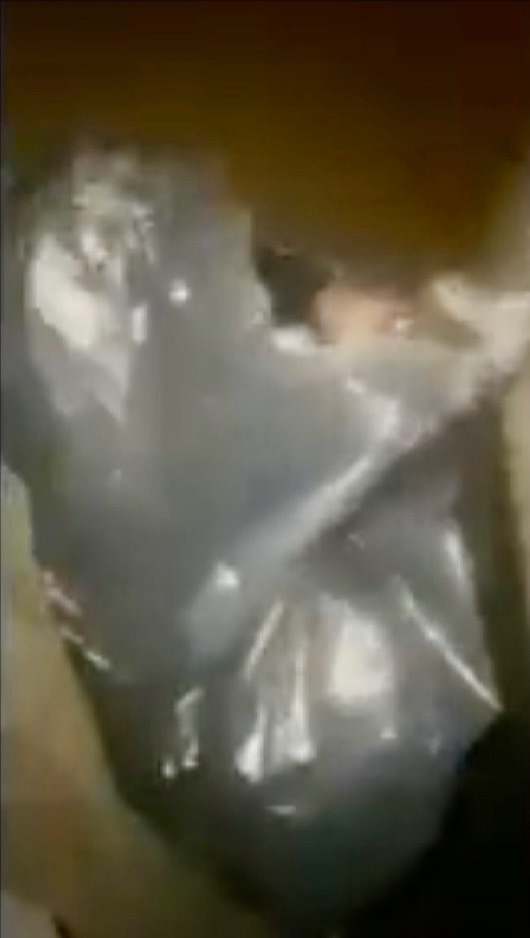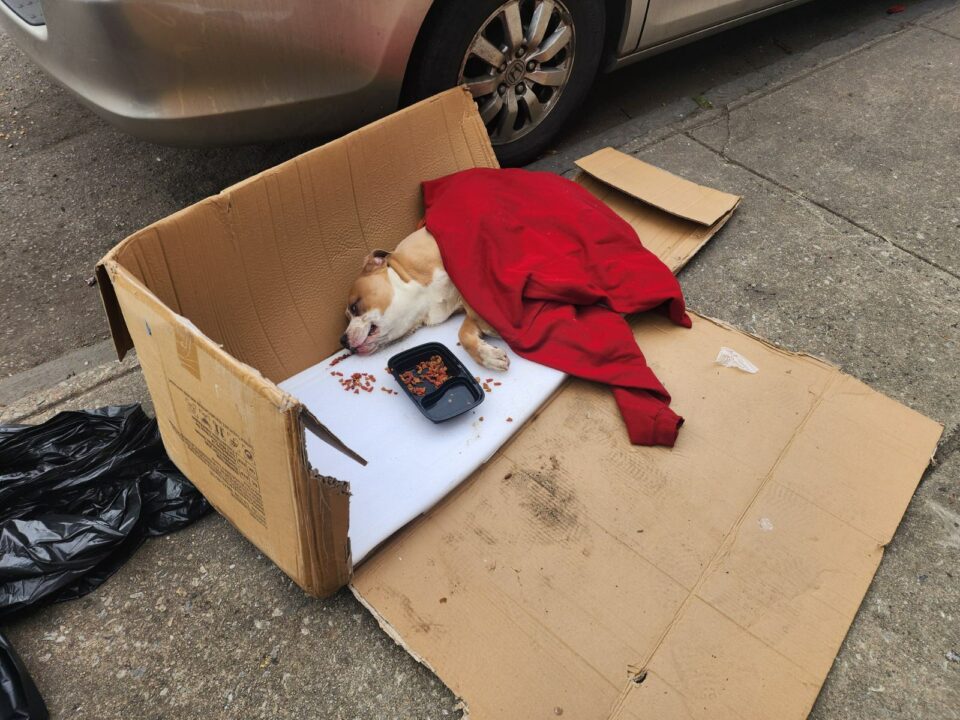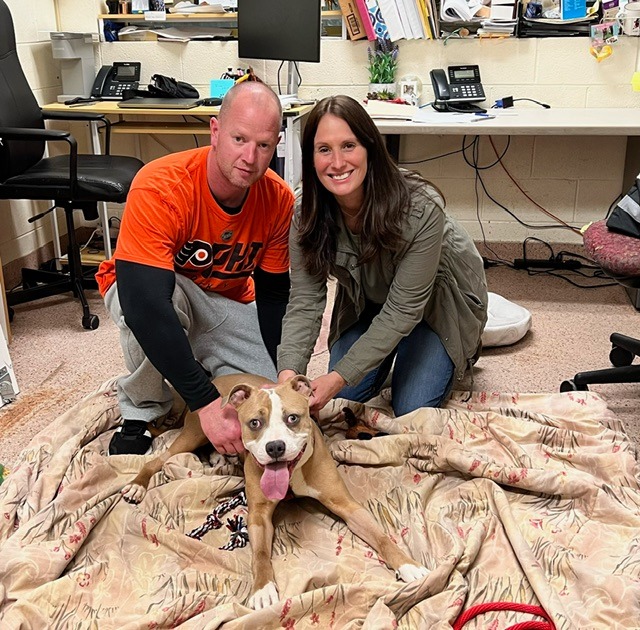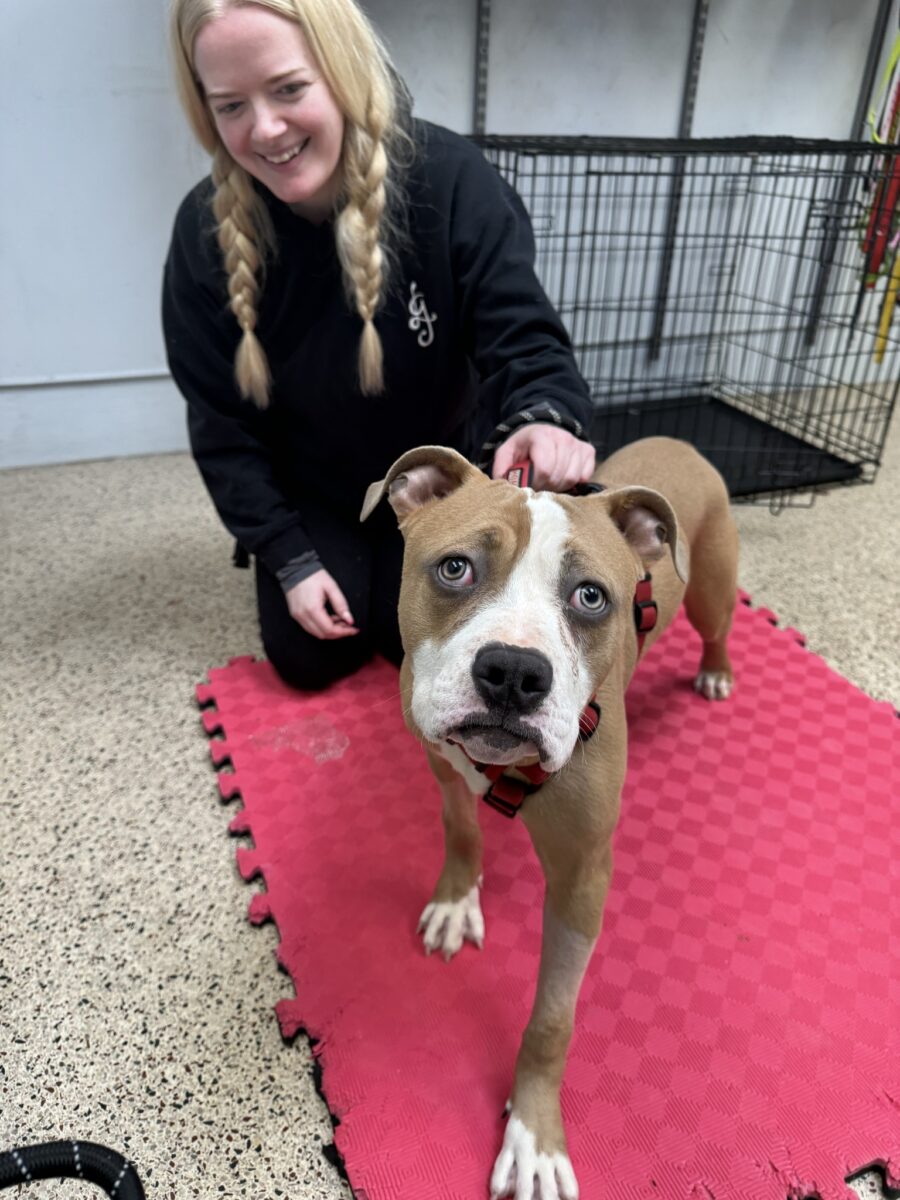Usually, when we wake up and get ready for our day, we don’t really think that we will end up being heroes that day.
So, when a Good Samaritan was working on a property in Philadelphia, they thought it was going to be just a regular day on the job.
However, while working, he noticed a discarded trash bag with something moving inside of it. He immediately rushed to investigate and, ripping open the bag, he saw something that completely took him by surprise.
Shocking Discovery

Inside of the bag, the worker found a white and tan Pittie that was in very bad condition.
The body of this terrified pup was completely stiff, and he could not move his head or his feet.
The heartbroken hooman gently took him out of the trash bag and placed him on a piece of cardboard. He also covered his stiff body with a blanket, hoping to keep him as warm as possible.
When he got the pup comfortable, he contacted the local authorities informing them of the situation.
While he waited, he gave the sweet boy some food hoping that he would take a few bites.

The Pennsylvania SPCA gladly answered the call and immediately headed down to the location of the pup.
When they arrived, they wasted no time and loaded the poor pup, later named Codi, into their car and took him to their facilities.
Seeing the condition Codi was in left the vets puzzled.
“What had happened to this poor soul? Why had he been discarded like trash?” Pennsylvania SPCA wrote in a Facebook post.
It didn’t take the vets too long to realize that Codi was unable to stand up on his paws. They conducted many tests and made sure that he was fed and had a lot of fresh water on hand.
They then started to stretch and massage his limbs, making sure that they were gentle and not scaring the pup.
After some time, Codi was able to stand up and even take his first careful steps.
Seeing this made his rescuers tear up. They knew that these steps meant that, one day, Codi would be able to live a normal life surrounded by incredible hoomans. But, what they didn’t know was that this was just around the corner.
As the Pennsylvania SPCA made sure to get the word out that this sweet boy was looking for a home – posting him on their social media and even advertising him on their local news – a loving family noticed him and completely fell in love.
Only one month after being found paralyzed inside of a trash bag, Codi found his forever home!

“The odds may have seemed against him, but he never gave up and last week, it all paid off when he found his forever home!” Pennsylvania SPCA wrote in a Facebook post about Codi’s adoption.
The SPCA staff were overjoyed!
The fact that Codi was so determined and able to turn his life around completely in such a short period brought smiles to their faces. They will never forget his resilience and bravery.
“His recovery was pretty remarkable. And though he’s still a little wobbly, he’s been adopted and is living the best life!” Gillian Kocher, Pennsylvania SPCA director of public relations, told The Dodo.
Codi forgot all about his past and is now living the life of any doggos dreams with a family who adores him for who he truly is.

Final Word
Even though I am so happy that Codi managed to get his happily ever after, the fact that he was so cruelly dumped in the first place breaks my heart.
I am aware that sometimes, hoomans are no longer able to care for their dogs, but abandoning them on the streets will never be the answer.
This is why shelters exist!
I am sure that if his previous owners surrendered Codi to their local shelter, this sweet boy would have recovered much faster and would have been able to move on in a healthier way.
Being separated from their hoomans can really take a toll on pups, but receiving love and reassurance from shelter staff can make the process a lot easier as it will allow them to understand that it is not their fault!
So if, for any reason, you can no longer care for your pup, please do not abandon it on the streets. Rather, take it to your local shelter and offer it a second chance – they deserve it.
If you’ve ever wondered why grapes are a big no-no for your furry companion, you’re not alone. As a seasoned dog trainer, one of the first lessons you learn is about the dangers of grapes for dogs. It’s a curious fact that many pet owners are unaware of, yet it’s crucial for your pup’s well-being.
Picture this: you’re enjoying a snack, and your dog gives you those pleading eyes, hoping for a bite. While sharing food with your pet can be tempting, when it comes to grapes, it’s a different story. Understanding why these seemingly harmless fruits can spell trouble for your canine friend is essential for responsible pet ownership.
The Dangers of Grapes to Dogs
Toxic Compounds in Grapes
Grapes and raisins are known to be highly toxic to dogs, even in small amounts. The exact substance within grapes that causes toxicity is still unknown, but it can lead to severe complications. This toxicity can affect dogs of any breed, size, or age.
Symptoms of Grape Poisoning
If a dog consumes grapes, they may exhibit symptoms such as vomiting, diarrhea, lethargy, and abdominal pain. In severe cases, kidney failure can occur, posing a grave risk to your furry friend’s health. It’s essential to be vigilant and seek immediate veterinary care if you suspect your dog has ingested grapes.
By understanding the dangers grapes pose to dogs and being proactive in keeping them away from your canine companion, you can ensure their well-being and longevity. Preventing access to grapes is a simple yet crucial step in responsible pet ownership.
Understanding Canine Metabolism
Why Dogs Process Grapes Differently
Dogs have a different metabolism compared to humans, particularly in how they process certain foods. Grapes contain compounds that can be harmful to dogs but are not necessarily toxic to humans. The exact reason why grapes are toxic to dogs is still unknown, but it’s clear that dogs lack the necessary enzymes to break down the components in grapes effectively. This difference in metabolic pathways makes grapes unsafe for your furry friend, leading to potential health issues even in small amounts.
Comparing Human and Canine Digestion
The digestive systems of humans and dogs differ significantly, impacting how they process various foods. Dogs have shorter digestive tracts, which affect the breakdown and absorption of nutrients. Additionally, dogs metabolize certain substances differently, making foods like grapes unsafe for them. While humans can enjoy grapes without any issues, dogs can suffer from severe reactions to even a small quantity. Understanding these distinctions in digestion is crucial to ensuring the health and well-being of your canine companion.
Case Studies and Veterinary Insights
Historical Cases of Grape Toxicity
In the past, several cases have shown the severe repercussions of dogs consuming grapes or raisins. Instances where dogs have ingested even a few grapes have led to symptoms such as vomiting, diarrhea, lethargy, and abdominal pain. These cases serve as stark reminders of the dangers grapes pose to our canine companions. Immediate veterinary attention is crucial when such ingestion occurs to prevent further complications.
What Veterinarians Say
Veterinarians unanimously warn against feeding grapes or raisins to dogs, highlighting the significant toxicity these fruits hold for our furry friends. They emphasize that dogs lack the necessary enzymes to process the specific compounds found in grapes efficiently. Due to this metabolic disparity between dogs and humans, grapes can trigger severe kidney issues in dogs, even in small quantities. Therefore, it’s essential to heed veterinary advice and keep grapes away from your four-legged pals to ensure their well-being.
Preventive Measures for Dog Owners
Safe Alternatives to Grapes
When choosing treats for your dog, opt for safe fruits like apples, blueberries, or bananas instead of grapes. These alternatives provide tasty options without the risks associated with grapes. Remember, safety first when it comes to your furry friend’s snacks.
Educating Others About the Risks
Spread awareness among fellow pet owners about the dangers of grapes for dogs. By educating others about this potential hazard, you can help prevent incidents of grape ingestion in dogs. Sharing knowledge within the community is key to keeping all dogs safe and healthy.
What to Do If Your Dog Eats Grapes
Immediate Steps and Treatment
If your dog consumes grapes, it’s crucial to act promptly. Take your furry friend to the vet immediately, even if they show no initial symptoms. The vet may induce vomiting or administer activated charcoal to prevent the absorption of toxins. Intravenous fluids may also be necessary to support kidney function.
Long-Term Health Monitoring
After grape ingestion, your dog will require long-term monitoring. Your vet may recommend blood tests to assess kidney function periodically. Ensure your dog stays hydrated, and watch for symptoms like decreased appetite, lethargy, or changes in urination habits. Early detection and ongoing care are vital for their well-being.
Conclusion
Remember, grapes can be extremely harmful to your furry friend, leading to serious health issues like kidney failure. It’s best to steer clear of grapes altogether and stick to safer fruit options such as apples, blueberries, or bananas. If your dog happens to ingest grapes, swift action is essential. Get in touch with your vet immediately for proper care, which may involve inducing vomiting, giving activated charcoal, and providing necessary fluids. Keep a close eye on your pup post-ingestion, ensuring they receive the necessary follow-up care to safeguard their health. Stay informed, stay vigilant, and keep your four-legged companion safe from the risks of grapes.
Frequently Asked Questions
Can dogs eat grapes?
No, dogs should not eat grapes. Grapes are toxic to dogs and can lead to kidney failure even with small amounts.
What fruits are safe for dogs to eat?
Safe fruits for dogs include apples, blueberries, and bananas. These fruits are a healthy and safe alternative to grapes.
What should I do if my dog eats grapes?
If your dog eats grapes, seek immediate veterinary care. Treatment may include inducing vomiting, administering activated charcoal, and providing intravenous fluids.
Is long-term monitoring necessary after a dog eats grapes?
Yes, long-term monitoring is crucial. This involves blood tests, hydration maintenance, and watching for specific symptoms to ensure the dog’s well-being.
[no_toc]

Hey there, I’m Janet Brooks, a dog-loving student from California. I’m all about helping pups in need, especially those without homes. Me and my awesome friends work together to give shelter and love to stray dogs. Oh, and I also write blogs about dogs to share helpful info.